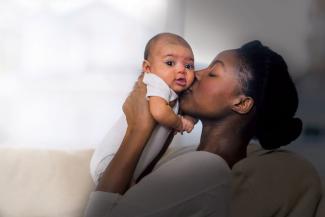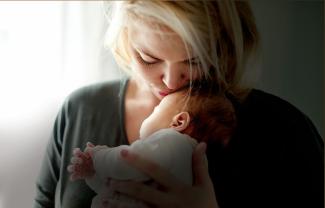
Mission
To improve the health and well-being of perinatal persons, their children, and families affected by prenatal substance exposure.
At least five percent of the approximately 10,000 babies born in Rhode Island each year are prenatally exposed to substances like alcohol, cannabis, nicotine, stimulants, and opioids. The Perinatal Substance Use Program seeks to ease any potential short- and long-term biopsychosocial effects for these children by linking pregnant people to supports like:
Newborns exposed to opioids and other substances between conception and delivery may experience withdrawal symptoms after birth, a condition known as Neonatal Abstinence Syndrome (NAS). Babies with NAS may require treatment for withdrawal symptoms and a longer stay in the hospital. In 2023 the Rhode Island NAS incidence rate was 52 per 10,000 live births.

What We Do
- Manage Rhode Island's Circle of Care (COC) Plan to support infants and their families affected by prenatal substance exposure, withdrawal symptoms, or Fetal Alcohol Spectrum Disorders (FASD). A Circle of Care Plan ensures that infants and caregivers affected by prenatal substance exposure receive the support and services they need and want after hospital discharge. Examples of services include Family Home Visiting, Early Intervention, and recovery supports.
- Chair the Rhode Island Perinatal Substance Use Task Force, a multidisciplinary group of professionals with a vested interest in improving the health and well-being of perinatal persons, their children, and families affected by prenatal substance exposure. Aligned with Governor Dan McKee’s Overdose Task Force, the Perinatal Substance Use Task Force focuses on care coordination, access to bias-free prenatal care and treatment, and protection of the parent-child relationship. The task force meets on the second Tuesday of the month from 2 p.m. to 3 p.m. on Microsoft Teams. Email the Chairperson if you’re interested in joining.
- Host the annual Rhode Island Perinatal Substance Use Conference. This conference brings together clinical, research, and community content experts to raise awareness of emerging best practices and policy information, as well as statewide resources to support pregnant and postpartum people and their babies and families affected by prenatal substance exposure.
- 2025 Conference Materials

Help is Available
If you or someone you know are pregnant and smoke, drink alcohol, take certain prescribed medications, or use cannabis or other drugs, your baby can be exposed to these substances and may need extra support and care. Connect with a perinatal peer recovery coach for safe, personalized, and non-judgmental recovery-focused support.
- Perinatal Peer Services - Call or text 401-895-6592
- Prevent Overdose RI
Media
Healing Mother and Baby: Supporting Pregnant and Parenting People Through Recovery – In this episode of the Public Health Out Loud podcast, find out more about neonatal abstinence syndrome and the work that peer recovery coaches do to help mothers and babies stay together.
Substance-Exposed Newborns – Brenda Alejo and Tyrone Jackson welcome Margo Katz, Katie Gonzalez, and Ashley Deckert to Rhody Family Matters podcast to discuss the challenges of pregnant persons who are coping with a substance use disorder and their options for recovery. podcast to discuss the challenges of pregnant persons who are coping with a substance use disorder and their options for recovery.
State Spotlight Series - The National Governor’s Association (NGA) recently highlighted the work of Rhode Island healthcare professionals as they continue to respond to the overlapping epidemics of substance use and infectious diseases like syphilis, HIV and HCV. Part of a four-state learning collaborative, the NGA praised Rhode Island’s longstanding investments in overdose prevention, drug user health, maternal and child health, and infectious disease prevention, as well as the creation of the Healthy Beginning campaign, which uses positive messaging to encourage pregnant individuals to access prenatal care.
